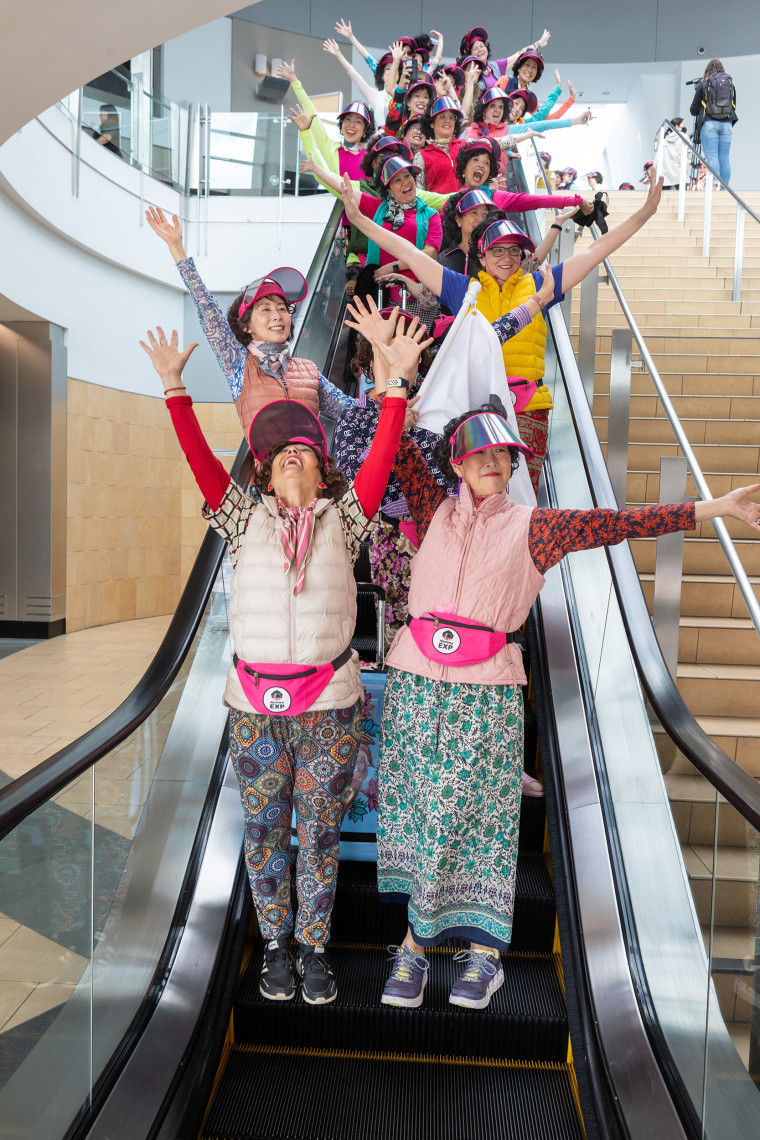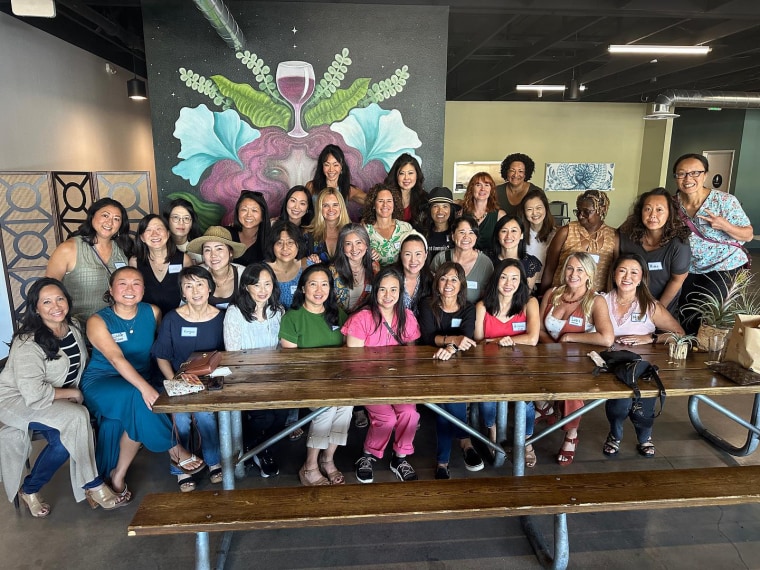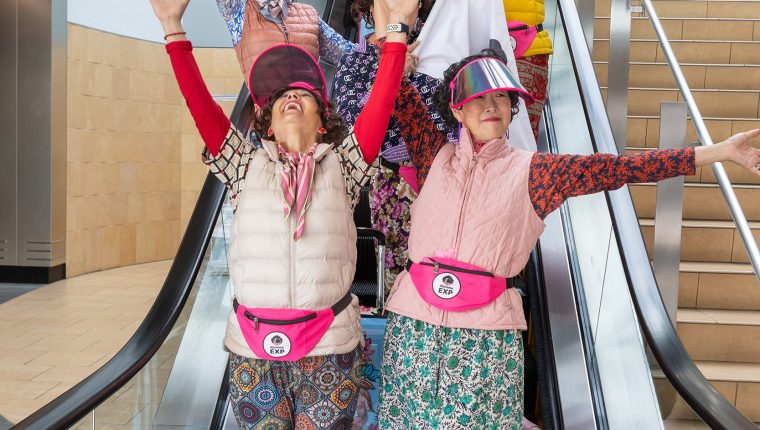A dance crew of 45 women flash-mobbed their way through San Diego this month, shimmying and twerking to Rihanna, dressed as ajummas, a lighthearted stereotype of middle-age South Korean women who sport sun visors, short permed hair and colorful, often mismatched, outfits.
The group, Ajumma EXP, performed to celebrate women of all ages for International Women’s Day and Women’s History Month.
The group came to existence in 2017 when, for her 47th birthday in San Diego, Lee Ann Kim got ready for a girls night out, dolled up in high black heels with a skin tight leopard print skirt and a tight black top over a padded bra.
Her friends had other wardrobe ideas: They rolled up in short curly wigs, visors and garish clothing. They teased her by saying: “‘Hey, Ajumma, you’re over the hill,’” Kim, a former TV anchor, said. “So I went inside and I changed my clothes, and we all went out as ajummas that night.”
That night out birthed the idea for the flash mob dance group Ajumma EXP, which Kim founded with her friend Sonia Chin and with the help of choreographer Melissa Adao. Now in its seventh season, the group-turned-viral sensation is still going strong.

“It was so liberating, to not have to worry about what we looked like and also not to have to worry about men’s gaze. But at the same time, there was no gaze. We were really invisible,” Kim said.
“BTS was starting to come on scene, Blackpink was already on scene and we decided on the name Ajumma EXP because it sounded K-pop-y and EXP meant experience, experiments, expression, many things,” Kim said. “We specifically only picked hip-hop, not K-pop — because people expected us to do K-pop. And we would show up in grocery stores and shopping malls.”
What started off with about a dozen women now has almost 50 ajummas from a diversity of backgrounds — other Asians, Latina, Black and white women, she said.
“I cannot believe how what was just kind of a fun sassy idea literally turned into a movement. We have so many women in different cities who are like, ‘Oh my God, I want to start one!’ ‘Oh my God, you inspire me.”
The video of Ajumma EXPs flash mob to Missy Elliott’s “Work It” last year has garnered nearly 1 million views on Tik Tok. Kim says women in other cities — and even other countries — have expressed interest in starting a chapter. To date, the San Diego group is the only one.
On March 2, the ladies had their largest scale performance to date: a series of flash mobs in quintessential San Diego venues: Balboa Park, San Diego Zoo, Fashion Valley Mall and even inside San Diego International Airport. Forty-five women, dressed in colorful patterned pants, curly-haired wigs, visors, fanny packs, scarves and vests threw down to Rihanna’s “Don’t Stop the Music.”
The history of ajummas
In South Korea, where Kim and her co-founder Chin were born, ajummas are treated with respect, fear and derision. The word, which translates roughly into “ma’am” or “auntie,” refers to women between their 30s and 70s, expected to be married, mothers and housewives.
Historically they’re women who raised families while filling in the labor shortages due to the Japanese occupation and Korean War. Hence the stereotype built around women who lived through those turbulent decades as blunt, gruff and wearing black or colorful prints and visors to keep the sun off their face.
Short tight curls are visual shorthand for ajummas. The hairstyle has its roots in the Japanese colonization of Korea, when perms, which were only available in department store salons, denoted wealth. Women were relegated to housework, child rearing and making a living, and, since electricity was scarce in the 1950s and 1960s, perms were an economical, low maintenance way to style hair. To keep the curls lasting for as long as possible the “ajumma perms” were initially set very tight.
For Ajumma EXP, loyalty to this stereotyped image is key, even if it’s becoming outdated. “The costume is really an homage to the old school Ajumma,” Kim said. “But if you show up as what looks like an old lady, [people will think] ‘Oh my god, what are these ladies about to do — some kind of Zumba?’ And then, “Oh …They just threw down some hip-hop moves!’ That’s when you grab their attention. And we’re just trying to kind of turn things upside down for people.”
Today, due to demographic and cultural shifts, Korean women in their 40s, 50s and 60s are often working office jobs and still adhere to strict Korean beauty standards emphasizing thinness, flawless glass skin and high fashion. The stereotypes associated with ajummas have turned so negative that the term is being phased out by post-war generations.

For Kim, it’s important that the term endures, wild prints and perms intact.
“Essentially, the word ajumma is beginning to disappear from the Korean vocabulary, because it’s seen as such a hate-filled word. When you sit down and think about history and how ajummas literally kept the country of Korea together, they deserve a lot more love and attention.”
She also said they have a deeper mission. “Ajumma EXP is not about just shining a spotlight on middle-aged women. Specifically for me and Sonia, we’re both Korean American. It’s about reclaiming that word ajumma and redefining it as something positive and something that we can take ownership of.”
And Kim points out a woman doesn’t need to be part of the official group to join the party. “You should just get yourself a visor and a wig and go out with your friends one night like ajummas. It’s such a wild experience.”
Source: | This article originally belongs to Nbcnews.com









